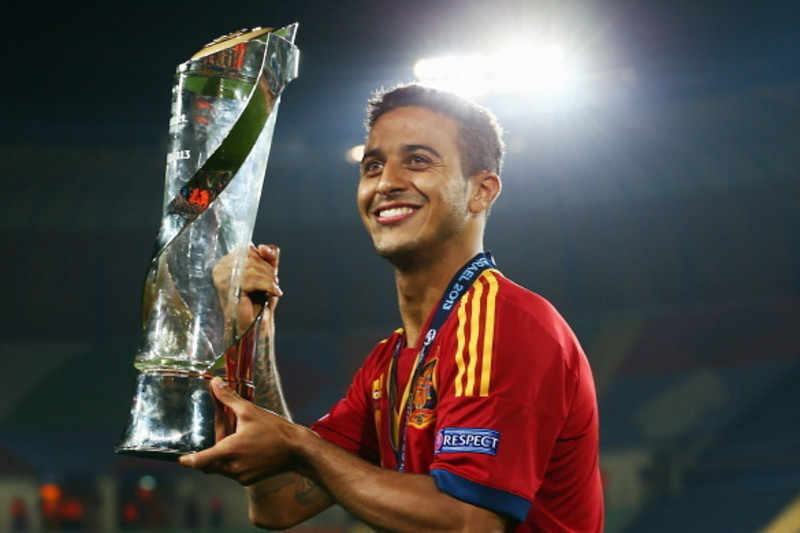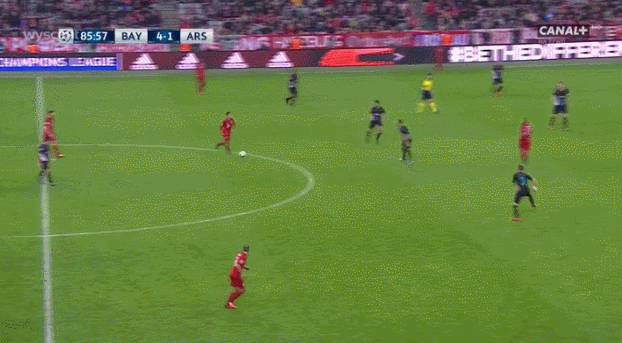Physiocrat
Has No Mates
- Joined
- Jun 29, 2010
- Messages
- 9,558
BIG_DUNK

Enigma_87

BIG_DUNK Tactics
Flexible 4-1-3-2 shape. Solid and compact in the defensive phase, clever movement and direct in the attacking phase.
Law and Seeler are unleashed in my system. My potent strike partnership offers off-ball industry, clever link-up play across the pitch and elite finishing. Two hard-working forwards who will make intelligent runs in both the inside and outside channels. Häßler, Jugović and Matthäus will supply world-class crosses and long passes to my front two. Seeler and Law are both lethal in the air, in the box or running into the last third on the end of crosses. Law and Seeler's intelligent movement will pull my opponent's defence out of position, creating space for each other or my midfielders to exploit.
Both Jugović and Häßler can drift inside from the wing into clever positions between the lines. Two very industrious and creative side midfielders, who will help defensively, supporting my fullbacks and help in the build-up phase, able to tuck in or stay wide. Voronin is the perfect defensive screen in front of my back line, while linking defence to the attack with his excellent ball distribution. Voronin can also provide deep cover, never allowing us to be outnumbered defending a counterattack, but also allowing Belodedici to step up to initiate attacks. The defensive security and high workrate of Voronin, Häßler and Jugović provides the platform for Matthäus to play his peak box-to-box role, with the freedom to make his driving penetrative runs beyond Law or Seeler. When defending my midfield quartet will form a compact line.
We have a balanced centreback partnership in Stam, a tough and physically dominant stopper, paired with Belodedici, an elegant and intelligent sweeper, both experts in positioning, reading of the game and tackling. At right back is Gerets, whose tenacious defending and endless running down the flank made him an influential one-man wing. Gerets will be encouraged to overlap Häßler, supporting the attack. Briegel is a versatile defender boasting incredible physique and able provide width down the flank or covering centrally.
Enigma_87 Tactics
Formation: 4-3-3, similar to Bayern around Robbery and Lewa. Exploit the flanks, moderate press and control the proceedings in the middle of the park.
Defence:
Two great full backs in Cole and Zanetti, with the latter being the more attacking one in this game. Cole will be in his balanced role, providing support in attack. Dias and Cannavaro are at the heart of defence. Dias will be key in his distribution from the back, Cannavaro as a stopper and foil alongside him. Moderate defensive line.
Midfield:
So after the first game the midfield is revamped with the addition of two midfield maestros - Gundogan and Thiago. Souness is holding in this game in a more deeper role where he is protecting the back four. Souness has the tactical and defensive nous to keep the line whilst Gundo and Thiago will act as two dynamic 8's like Gundogan playing alongside KdB and Thiago played with Kimmich or Fabinho as holder.
Attack:
The focal point of the team - one of the finest wingers the game ever seen, which also enjoyed great success playing together - Robben and Ribery. As a complete central forward we have Marco van Basten who would feed off the creativity behind him but also be what would be expected from modern #9.
Focal points:
- Robbery and Van Basten. A trio that had it all and would be very difficult to stop.
- Defensive line consisting of two of the most balanced full backs that are solid at the back and can keep things tight. In the Dias/Cannavaro is also IMO a very complimentary pair and as good as it gets given the theme of the draft
- midfield line that can control the pace and tempo of the game, but also each one of them can contribute in the defensive phase and harass the opposition and force them into losing possession.
A little bit of Marco magic:
Tactics:
- Building from the back. We have a midfield that is comfortable on the ball with of course the help of our midfield line dropping back like Thiago/Souness/Gundogan do to offer passing lanes.
- Aggressive press. We aim to win possession back quickly. The aim is to keep the opposition passing lanes short so we are closer to the ball and win it back quickly. Our team is full of athletic players that can keep up with a high tempo and limit the opposition time on the ball.
- win the ball and stretch the opposition on counter. When we have three excellent passers in the middle it's easy to use the flanks and stretch the opposition flank especially when on counter or when the opposition loses the ball. Our aim is to both use the flanks to create superiority out wide when our winger beats the full back but also use van Basten prowess in the box.
Little stuff on Gundogan:

Enigma_87

BIG_DUNK Tactics
Flexible 4-1-3-2 shape. Solid and compact in the defensive phase, clever movement and direct in the attacking phase.
Law and Seeler are unleashed in my system. My potent strike partnership offers off-ball industry, clever link-up play across the pitch and elite finishing. Two hard-working forwards who will make intelligent runs in both the inside and outside channels. Häßler, Jugović and Matthäus will supply world-class crosses and long passes to my front two. Seeler and Law are both lethal in the air, in the box or running into the last third on the end of crosses. Law and Seeler's intelligent movement will pull my opponent's defence out of position, creating space for each other or my midfielders to exploit.
Both Jugović and Häßler can drift inside from the wing into clever positions between the lines. Two very industrious and creative side midfielders, who will help defensively, supporting my fullbacks and help in the build-up phase, able to tuck in or stay wide. Voronin is the perfect defensive screen in front of my back line, while linking defence to the attack with his excellent ball distribution. Voronin can also provide deep cover, never allowing us to be outnumbered defending a counterattack, but also allowing Belodedici to step up to initiate attacks. The defensive security and high workrate of Voronin, Häßler and Jugović provides the platform for Matthäus to play his peak box-to-box role, with the freedom to make his driving penetrative runs beyond Law or Seeler. When defending my midfield quartet will form a compact line.
We have a balanced centreback partnership in Stam, a tough and physically dominant stopper, paired with Belodedici, an elegant and intelligent sweeper, both experts in positioning, reading of the game and tackling. At right back is Gerets, whose tenacious defending and endless running down the flank made him an influential one-man wing. Gerets will be encouraged to overlap Häßler, supporting the attack. Briegel is a versatile defender boasting incredible physique and able provide width down the flank or covering centrally.
Enigma_87 Tactics
Formation: 4-3-3, similar to Bayern around Robbery and Lewa. Exploit the flanks, moderate press and control the proceedings in the middle of the park.
Defence:
Two great full backs in Cole and Zanetti, with the latter being the more attacking one in this game. Cole will be in his balanced role, providing support in attack. Dias and Cannavaro are at the heart of defence. Dias will be key in his distribution from the back, Cannavaro as a stopper and foil alongside him. Moderate defensive line.
Midfield:
So after the first game the midfield is revamped with the addition of two midfield maestros - Gundogan and Thiago. Souness is holding in this game in a more deeper role where he is protecting the back four. Souness has the tactical and defensive nous to keep the line whilst Gundo and Thiago will act as two dynamic 8's like Gundogan playing alongside KdB and Thiago played with Kimmich or Fabinho as holder.
Attack:
The focal point of the team - one of the finest wingers the game ever seen, which also enjoyed great success playing together - Robben and Ribery. As a complete central forward we have Marco van Basten who would feed off the creativity behind him but also be what would be expected from modern #9.
Focal points:
- Robbery and Van Basten. A trio that had it all and would be very difficult to stop.
- Defensive line consisting of two of the most balanced full backs that are solid at the back and can keep things tight. In the Dias/Cannavaro is also IMO a very complimentary pair and as good as it gets given the theme of the draft
- midfield line that can control the pace and tempo of the game, but also each one of them can contribute in the defensive phase and harass the opposition and force them into losing possession.
A little bit of Marco magic:
Tactics:
- Building from the back. We have a midfield that is comfortable on the ball with of course the help of our midfield line dropping back like Thiago/Souness/Gundogan do to offer passing lanes.
- Aggressive press. We aim to win possession back quickly. The aim is to keep the opposition passing lanes short so we are closer to the ball and win it back quickly. Our team is full of athletic players that can keep up with a high tempo and limit the opposition time on the ball.
- win the ball and stretch the opposition on counter. When we have three excellent passers in the middle it's easy to use the flanks and stretch the opposition flank especially when on counter or when the opposition loses the ball. Our aim is to both use the flanks to create superiority out wide when our winger beats the full back but also use van Basten prowess in the box.
Little stuff on Gundogan:








 at that Vieri Jugovic story about the Atletico move. I always thought he was a player that moved too much; i had read about the Juventus sale being against Lippi's wishes but didn't know about the circumstances of that one. It didn't seem to make much career sense at the time, with Lazio on the rise and Atletico quite unstable.
at that Vieri Jugovic story about the Atletico move. I always thought he was a player that moved too much; i had read about the Juventus sale being against Lippi's wishes but didn't know about the circumstances of that one. It didn't seem to make much career sense at the time, with Lazio on the rise and Atletico quite unstable.


